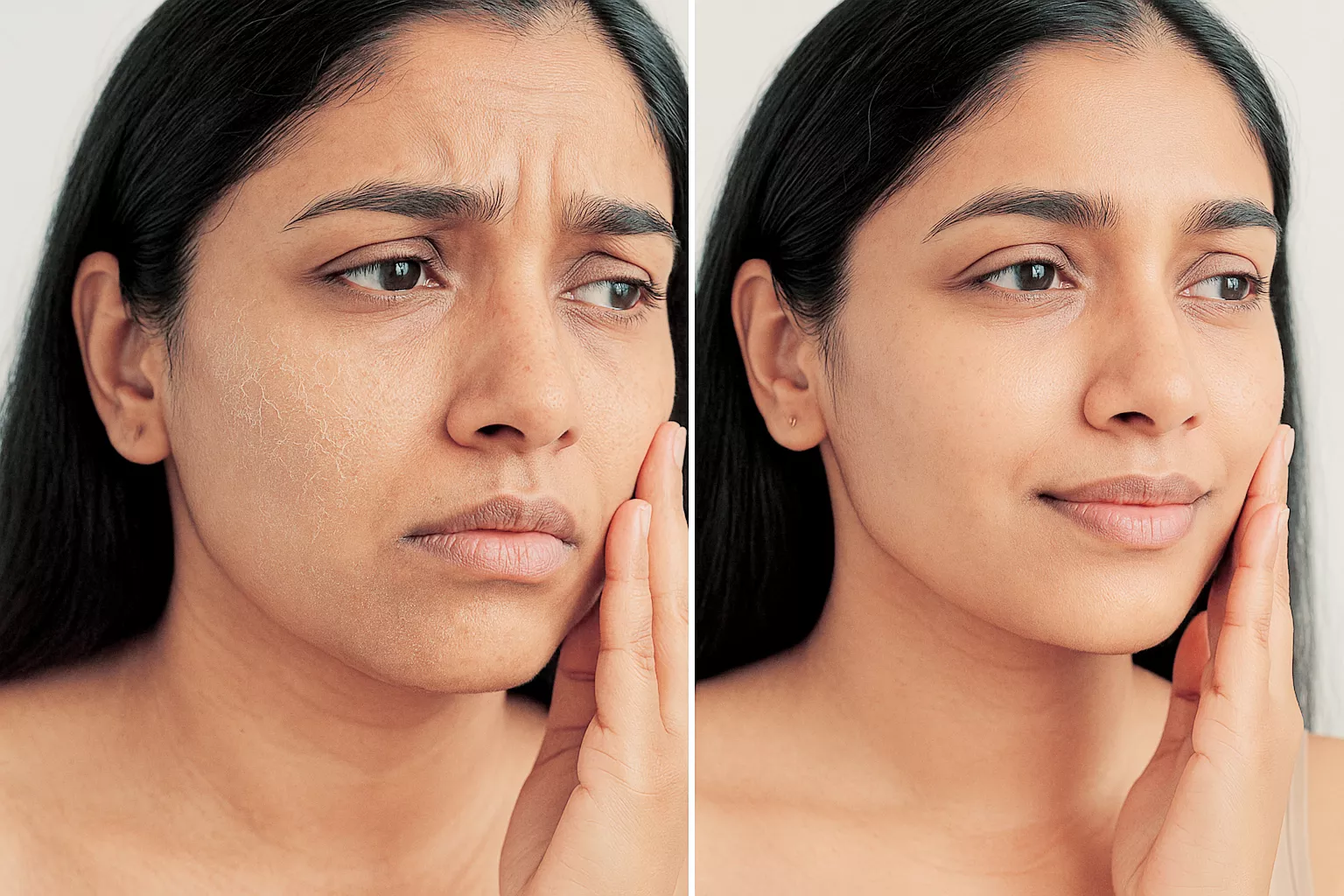Dry Skin? The Reason Behind it and Treatments that Work

If your skin constantly feels tight, flaky, or irritated no matter how much you moisturise — you’re not imagining it. Chronic dryness can be more than just a seasonal annoyance or a skipped moisturiser. In many cases, there’s a deeper reason your skin isn’t holding onto hydration the way it should. Below, we break down the most common causes of really dry skin.
Genetics
Some people are simply born with skin that struggles to stay hydrated. One key reason? Filaggrin, a protein essential for maintaining a strong skin barrier. Mutations in the gene that produces it can lead to skin that loses moisture easily and is more prone to irritation — a known factor in conditions like atopic dermatitis. Even without visible flare-ups, this genetic trait can cause skin to feel rough, tight, or sensitive, particularly in colder climates or after using harsh products.
Thyroid Issue
Hypothyroidism, or an underactive thyroid, is a lesser-known but common cause of persistently dry skin.
When thyroid hormone levels drop, your skin’s ability to regulate oil and cell turnover slows down. The result? Skin that becomes coarse, dull, and rough in texture — sometimes even thickened or scaly. It’s especially noticeable on areas like the elbows, shins, and hands. In some cases, you might also notice brittle nails, hair thinning, or a pale, washed-out complexion.
Harsh Soaps or Fragrance-Containing Products
Many soaps, cleansers, and body washes are packed with ingredients that strip the skin’s natural oils and disrupt the protective barrier that keeps moisture and irritants out.
Poor Diet
A lack of proper nutrients can disrupt your skin’s ability to retain moisture and make it more prone to irritation, flakiness, and a tight, uncomfortable feeling.
Omega-3 fatty acids, especially ALA (alpha-linolenic acid), DHA, and EPA, play a crucial role in skin barrier function. They help regulate inflammation, support the production of ceramides, and influence filaggrin expression — a key protein that keeps the skin’s structure intact.
To support skin health from the inside out, look to foods naturally rich in omega-3s, such as:
Fatty fish like salmon, mackerel, and sardines
Seaweed and algae (especially for plant-based DHA)
Hemp seeds and canola oil
Long, Hot Showers
Excessive exposure to hot water can weaken your skin barrier, leaving it drier and more irritated over time. Hot water increases transepidermal water loss (TEWL), disrupts pH balance, and can even trigger redness and inflammation. Dial down the heat, keep your showers under 10 minutes, and use lukewarm water instead.
Smoking
We all know smoking isn’t great for anyone — and your skin doesn’t get a pass either. Besides the usual health concerns, research suggests that smoking (both firsthand and secondhand) may increase your risk of developing inflammatory skin conditions like atopic dermatitis, a common cause of chronic dryness. If quitting feels overwhelming, know this: every step you take toward reducing exposure helps — for your skin and your overall health.
Hard Water
If you’ve moved recently and your skin suddenly feels drier or more irritated — and nothing else has changed in your routine — your tap water might be worth a second look.
Hard water contains higher levels of minerals like calcium and magnesium. These minerals can interact with soaps and cleansers and make them less effective and more difficult to rinse off. The residue left behind can disrupt the skin’s pH, strip natural oils, and weaken skin barrier.
Professional Treatments That Can Help
Professional treatments can help reset and deeply nourish dry, dull, or flaky skin:
Microdermabrasion: A gentle exfoliating treatment that buffs away dead skin cells, allowing your products to penetrate better and improving texture over time.
Facial Treatments: A tailored facial using hydrating masks, LED light, or lymphatic massage can help boost circulation and deliver targeted moisture deep into the skin.
Chemical Peels: When done with the right acids (like lactic or mandelic acid), peels can gently exfoliate while also improving your skin’s ability to retain moisture.
Skin Needling (Microneedling): Helps stimulate collagen and improves absorption of hydrating serums. Some formulations even focus on restoring barrier function and moisture retention.
In conlusion
From genetics to the environment, there are layers of influence that go beyond basic skincare routines, which may affect skin dryness. The key is learning to read your skin, not just react to it.
If you’ve tried it all and nothing seems to work, it might be time to get in touch with an experienced aesthetic physician at DNCC. Call 741 496 9509 today to schedule a FREE consultation. We can help you decode what’s really going on and build a treatment plan just for your skin.